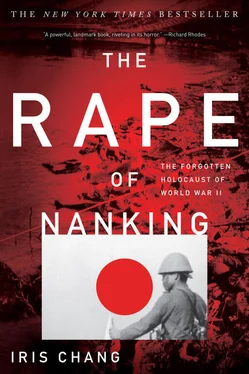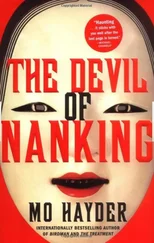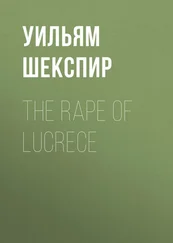A second factor in the atrocities, scholars believe, is the virulent contempt that many in the Japanese military reserved for Chinese people—a contempt cultivated by decades of propaganda, education, and social indoctrination. Though the Japanese and the Chinese share similar if not identical racial features (which in a distorted way may have threatened the Japanese vision of themselves as unique), there were those in the imperial army who saw the Chinese as subhuman beings whose murder would carry no greater moral weight than squashing a bug or butchering a hog. In fact, both before and during the war members of the Japanese military at all levels frequently compared the Chinese to pigs. For example, a Japanese general told a correspondent: “To be frank, your view of Chinese is totally different from mine. You regard the Chinese as human beings while I regard the Chinese as pigs.” A Japanese officer in Nanking who bound Chinese captives together in groups of ten, pushed each group into a pit, and burned them excused his actions by explaining that his feelings when committing these murders were identical to those he had when he slaughtered pigs. In 1938 the Japanese soldier Azuma Shiro confided in his diary at Nanking that “a pig is more valuable now than the life of a [Chinese] human being. That’s because a pig is edible.”
A third factor was religion. Imbuing violence with holy meaning, the Japanese imperial army made violence a cultural imperative every bit as powerful as that which propelled Europeans during the Crusades and the Spanish Inquisition. “Every single bullet must be charged with the Imperial Way, and the end of every bayonet must have the National Virtue burnt into it,” one Japanese general declared in a speech in 1933.
Few Japanese doubted the righteousness of their mission in China. Nagatomi Hakudo, a former Japanese soldier who participated in the Rape of Nanking, said he had been reared to believe that the emperor was the natural ruler of the world, that the Japanese were racially superior to the rest of the world, and that it was the destiny of Japan to control Asia. When a local Christian priest asked him, “Who is greater, God or the emperor of Japan?,” he had no doubt that “the emperor” was the correct answer.
With an entity higher than God on its side, it was not difficult for the Japanese military to take the next step—adopting the belief that the war, even the violence that came with it, would ultimately benefit not only Japan but its victims as well. Some perceived atrocity as a necessary tool to achieve a Japanese victory that would serve all and help create a better China under Japan’s “Greater East Asian Co-Prosperity Sphere.” This attitude echoes that of the Japanese teachers and officers who beat their students and soldiers senseless while insisting, between blows, that it was all done for their own good.
Perhaps it was General Matsui Iwane who summed up the prevailing mentality of self-delusion best when he attempted to justify Japanese oppression of China. Before he left for Shanghai in 1937, he told his supporters: “I am going to the front not to fight an enemy but in the state of mind of one who sets out to pacify his brother.” Later he would say of the invasion of China:
The struggle between Japan and China was always a fight between brothers within the “Asian Family.”… It had been my belief during all these days that we must regard this struggle as a method of making the Chinese undergo self reflection. We do not do this because we hate them, but on the contrary we love them too much . It is just the same as in a family when an elder brother has taken all that he can stand from his ill-behaved younger brother and has to chastise him in order to make him behave properly.
Whatever the course of postwar history, the Rape of Nanking will stand as a blemish upon the honor of human beings. But what makes the blemish particularly repugnant is that history has never written a proper end for the story. Even in 1997, the Japanese as a nation are still trying to bury the victims of Nanking—not under the soil, as in 1937, but into historical oblivion. In a disgraceful compounding of the offense, the story of the Nanking massacre is barely known in the West because so few people have tried to document and narrate it systematically to the public.
This book started out as an attempt to rescue those victims from more degradation by Japanese revisionists and to provide my own epitaph for the hundreds upon thousands of unmarked graves in Nanking. It ended as a personal exploration into the shadow side of human nature. There are several important lessons to be learned from Nanking, and one is that civilization itself is tissue-thin. There are those who believe that the Japanese are uniquely sinister—a dangerous race of people who will never change. But after reading several file cabinets’ worth of documents on Japanese war crimes as well as accounts of ancient atrocities from the pantheon of world history, I would have to conclude that Japan’s behavior during World War II was less a product of dangerous people than of a dangerous government, in a vulnerable culture, in dangerous times, able to sell dangerous rationalizations to those whose human instincts told them otherwise. The Rape of Nanking should be perceived as a cautionary tale—an illustration of how easily human beings can be encouraged to allow their teenagers to be molded into efficient killing machines able to suppress their better natures.
Another lesson to be gleaned from Nanking is the role of power in genocide. Those who have studied the patterns of large-scale killings throughout history have noted that the sheer concentration of power in government is lethal—that only a sense of absolute unchecked power can make atrocities like the Rape of Nanking possible. In the 1990s R. J. Rummel, perhaps the world’s greatest authority on democide (a term he coined to include both genocide and government mass murder), completed a systematic and quantitative study of atrocities in both the twentieth century and ancient times, an impressive body of research that he summed up with a play on the famous Lord Acton line: “Power kills, and absolute power kills absolutely.” The less restraint on power within a government, Rummel found, the more likely that government will act on the whims or psychologically generated darker impulses of its leaders to wage war on foreign governments. Japan was no exception, and atrocities such as the Rape of Nanking can be seen as a predictable if not inevitable outgrowth of ceding to an authoritarian regime, dominated by a military and imperial elite, the unchallenged power to commit an entire people to realizing the sick goals of the few with the unbridled power to set them.
And there is yet a third lesson to be learned, one that is perhaps the most distressing of all. It lies in the frightening ease with which the mind can accept genocide, turning us all into passive spectators to the unthinkable. The Rape of Nanking was front-page news across the world, and yet most of the world stood by and did nothing while an entire city was butchered. The international response to the Nanking atrocities was eerily akin to the more recent response to the atrocities in Bosnia-Herzegovina and Rwanda: while thousands have died almost unbelievably cruel deaths, the entire world has watched CNN and wrung its hands. One could argue that the United States and other countries failed to intervene earlier to prevent the Nazis from carrying out their “final solution” because the genocide was carried out in wartime secrecy and with such cold efficiency that until Allied soldiers liberated the camps and saw with their own eyes the extent of the horror, most people could not accept the reports they had been getting as literally true. But for the Rape of Nanking, or for the murders in the former Yugoslavia, there can be no such excuse. The Nanking atrocities were splashed prominently across the pages of newspapers like the New York Times, while the Bosnia outrages were played out daily on television in virtually every living room. Apparently some quirk in human nature allows even the most unspeakable acts of evil to become banal within minutes, provided only that they occur far enough away to pose no personal threat.
Читать дальше











